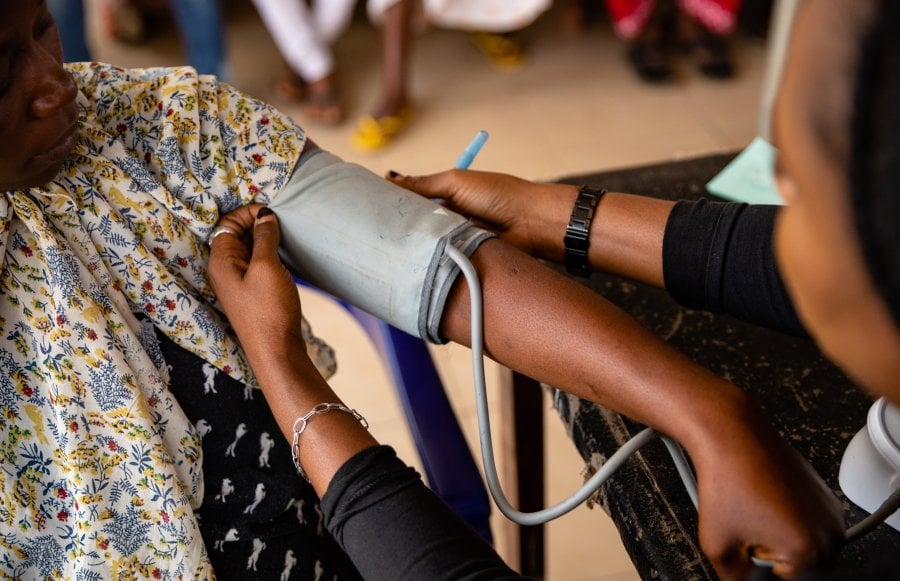
A nurse takes the blood pressure of a woman
Researchers at the MRC Unit The Gambia at LSHTM, in collaboration with Gambia Government partners and institutions including the International Centre for Eye Health (ICEH) at the London School of Hygiene & Tropical Medicine analysed the 2019 Gambia National Eye Health Survey of adults aged 35 years or older to better understand the prevalence of Non-Communicable Diseases (NCDs), multimorbidity and related risk factors in adults in The Gambia.
The study provides the latest data on hypertension, diabetes, obesity and related risk factors, which are leading causes of other conditions such as, ischaemic heart disease, stroke, chronic kidney diseases, and cancers among middle-aged and older adults.
The nationally representative survey included 9188 participants, 54.8% of whom were from urban areas and 70.5% were women. The survey shows very high levels of hypertension, and concerning levels of obesity, diabetes, and multimorbidity in both men and women.
Overall, the data shows a higher prevalence of NCDs in The Gambia in women compared to men. The prevalence of hypertension was 47.0%, affecting 49.3% of women and 44.7% of men. This prevalence increased with age, rising from 30% in those aged 35–45 years to over 75% in those aged 75 years and older. Obesity increased the odds of hypertension and underweight reduced the odds. The prevalence of diabetes was 6.3%, affecting 7.0% of women and 5.6% of men. The prevalence of obesity was 12.0% and was notably higher in women (20.2%) than men (3.9%).
However, the nationwide prevalence of smoking was 9.7%. However, this was almost exclusively in men (19.3%) compared to women (0.1%).
“The findings in this study are quite alarming and show an increasing trend of non-communicable diseases compared to earlier studies in The Gambia. This possibly reflects the effect of rapid urbanisation, and the pace at which dietary patterns and other behavioural risk factors are changing in The Gambia. The good news is that all these factors are amenable to a comprehensive and coordinated multisectoral intervention”, Dr. Modou Jobe, lead author of this study, MRC Unit The Gambia at LSHTM.
"A surprising aspect of the prevalence data is that contrary to the case for diabetes, hypertension is equally common in people living in rural areas. Deciphering this anomaly should help in the design of preventative measures", said Prof Andrew Prentice, Theme Leader, Nutrition and Planetary Health at MRC Unit The Gambia at LSHTM.
Multimorbidity or the coexistence of two or more chronic conditions in the same individual was more common in women than men (15·9 vs 5·5), thus contributing to health inequalities.
“The integration of this survey work on NCDs with data on ocular disease, mental health and musculoskeletal impairments in the 2019 Gambia National Eye Health Survey has highlighted the frequent intersection of different chronic conditions and the impact of this multimorbidity for The Gambia, providing a template for other countries,” Prof Matthew Burton, Director of ICEH at LSHTM said.
“These data are concerning but also timely as the government of The Gambia implements its recently launched NCD multisectoral strategic plan. We call on all stakeholders, both locally and internationally, to continue to support us in this endeavour.” Mr Omar Badjie, NCD Programme Manager at the Ministry of Health Gambia Government contributor/national stakeholder.
In May 2022, The Gambia launched a 5-year National Multi-sectoral strategy and costed action plan for non-communicable disease prevention and control. The overarching goal of this plan is to reduce premature deaths from NCDs in The Gambia by one-third by 2027.
Like many other developing countries within the subregion, The Gambia has made progress in reducing the prevalence of many infectious diseases and is on track to meet several health targets of the Sustainable Development Goals (SDGs). However, this research presents new challenges for the country’s already fragile health system which requires a collaborative national response to prioritise non-communicable diseases. MRCG and its partners remain committed to supporting and working together with national institutions to ease the burden of disease in The Gambia.
If you enjoyed this article and would like to build a career in global health, we offer a range of MSc programmes covering health and data, infectious and tropical diseases, population health, and public health and policy.
Available on campus or online, including flexible study that works around your work and home life, be part of a global community at the UK's no.1 public health university.
